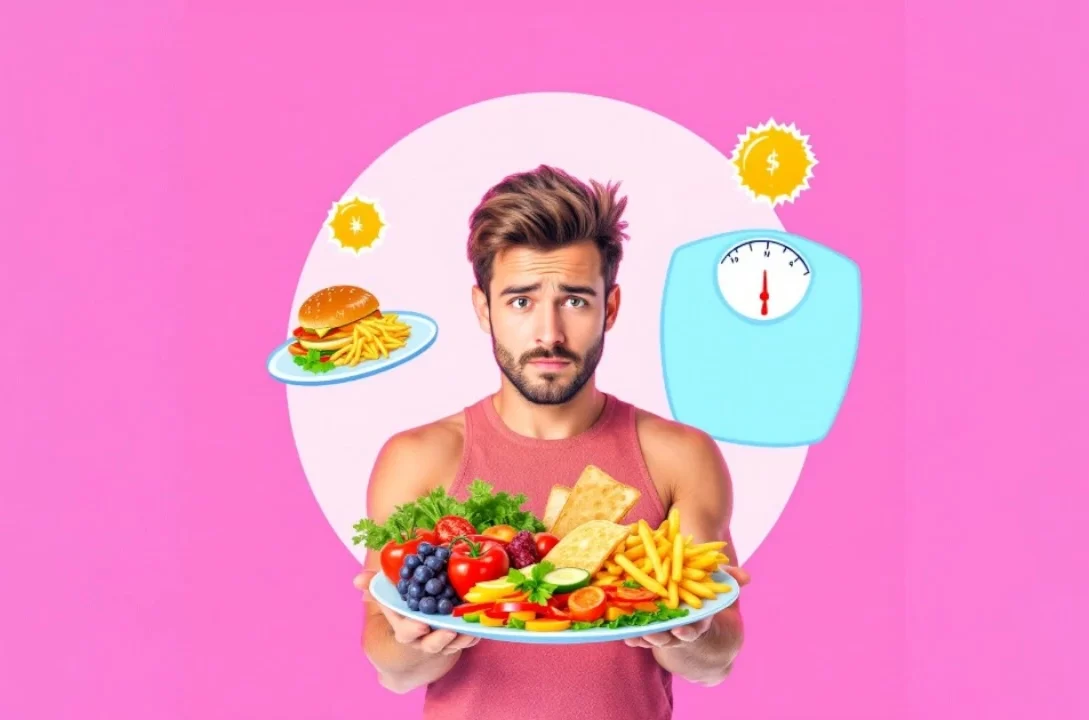You’re eating clean, cutting calories, and exercising regularly—yet the scale won’t budge. Worse, you might even be gaining weight despite your efforts.
The culprit? One common diet mistake that most people overlook. It’s not about willpower or genetics—it’s about how your body processes food under stress.
In this article, we’ll uncover the real reason your diet isn’t working and share simple, effective fixes to finally see results.
The Surprising Truth About Weight Gain
Most people blame weight gain on carbs, sugar, or lack of exercise—but research reveals a bigger hidden factor:
Chronic undereating and metabolic slowdown.
When you slash calories too aggressively, your body fights back by:
- Slowing your metabolism (burning fewer calories at rest).
- Increasing hunger hormones (ghrelin) and cravings.
- Storing more fat as a survival response.
This is why yo-yo dieting leads to long-term weight gain—not loss.
Why Restrictive Diets Backfire
Metabolic Adaptation: Your Body’s Survival Mode
When you eat too little for too long, your body thinks it’s starving. It responds by:
- Breaking down muscle (which lowers metabolism).
- Holding onto fat stores.
- Reducing energy levels (making workouts harder).
The Hunger Trap
Severe calorie cuts lead to:
- Obsessive food thoughts (your brain craves high-calorie foods).
- Binge cycles (overeating after prolonged restriction).
Hormonal Chaos
Low-calorie diets disrupt:
- Leptin (satiety hormone) – Signals fullness.
- Insulin – Manages blood sugar and fat storage.
- Cortisol – Stress hormone that promotes belly fat.
The Fix: How to Eat for Sustainable Weight Loss
Eat Enough to Lose Weight
- Calculate your maintenance calories (use an online TDEE calculator).
- Subtract only 10–20% for steady fat loss (no crash diets).
- Prioritize protein (keeps you full, preserves muscle).
Cycle Your Calories
- Higher-calorie days (boost metabolism, prevent plateaus).
- Lower-calorie days (create a deficit without shocking your system).
Focus on Nutrient Density
Fill your plate with:
- Lean proteins (chicken, fish, tofu).
- Fiber-rich veggies (broccoli, spinach, Brussels sprouts).
- Healthy fats (avocado, nuts, olive oil).
The Role of Stress and Sleep in Weight Loss
Cortisol and Belly Fat
Chronic stress increases cortisol, which:
- Triggers fat storage (especially around the abdomen).
- Raises blood sugar, leading to insulin resistance.
Fix it:
- Practice daily mindfulness (meditation, deep breathing).
- Get 7–9 hours of sleep (poor sleep = more cravings).
Sleep More, Weigh Less
Studies show that sleep-deprived people:
- Eat 300+ extra calories/day.
- Crave junk food (high sugar, refined carbs).
The Biggest Lie About “Healthy” Foods
Many so-called “diet” foods actually promote weight gain:
- Low-fat yogurt (packed with added sugar).
- Granola/protein bars (often candy bars in disguise).
- Diet soda (linked to increased belly fat).
Always check labels for hidden sugars and processed ingredients.
Simple Habits for Long-Term Success
Stop Obsessing Over the Scale
- Muscle weighs more than fat—track measurements and progress photos.
- Notice non-scale victories (more energy, better sleep).
Eat Mindfully
- Slow down (it takes 20 minutes for fullness signals to kick in).
- Avoid distractions (no phones/TV during meals).
Move for Joy, Not Punishment
- Find activities you love (dancing, hiking, swimming).
- Strength training boosts metabolism more than cardio alone.
FAQs About Weight Loss Mistakes
Why Am I Gaining Weight While Eating Healthy?
You might be under-eating, stressed, or eating hidden calories (oils, dressings, snacks).
Can You Lose Weight Without Cutting Calories?
Yes! Improving food quality, sleep, and stress management often leads to natural weight loss.
How Long Until My Metabolism Recovers?
It varies, but 3–6 months of consistent, adequate eating can restore metabolic rate.
Is It Normal to Hit a Weight Loss Plateau?
Yes—adjust calories, change workouts, or take a diet break to keep progressing.
Does Drinking Water Help with Weight Loss?
Absolutely! Hydration reduces false hunger and supports metabolism.
Final Thoughts: Ditch the Diet Mentality
The key to lasting weight loss isn’t extreme restriction—it’s nourishing your body, managing stress, and staying consistent.
Ready to break the cycle? Start by:
- Eating enough to fuel your metabolism.
- Sleeping 7+ hours nightly.
- Choosing whole, unprocessed foods 80% of the time.
Small, sustainable changes outperform short-term diets every time.
Internal Links:
- The Top Nutrition Trends That Will Change the Way You Eat in 2025!
- The Ultimate Spiritual Guide to Overcoming Life’s Biggest Challenges!
External Links:















